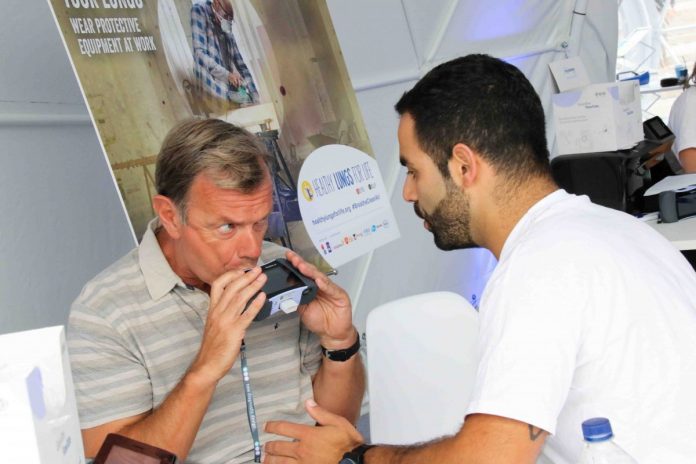Professor Guy Joos, President of the European Respiratory Society and Dan Smyth, Chair of the European Lung Foundation, look at the importance of healthy lungs and how air pollution can affect them…
Regular exposure to air pollution is linked to the development of certain lung conditions, such as chronic obstructive pulmonary disease (COPD), and lung cancer and it can shorten life expectancy.
Despite the evidence supporting this, there is still a lack of awareness amongst the general public about how they can reduce their exposure and among healthcare professionals about what practical information they can deliver to help patients.
Clean air means air free from particulate matter, pathogens, smoke and dangerous gases. We all have little control over the air that we breathe, but learning more about the quality of air and its impact can help us to find the best way to protect ourselves. Air pollution could refer to the quality of the air we breathe while at home, in the workplace, and outdoors exercising and commuting.
The effects of air pollution on the lungs depend on the type and mix of pollutants, the concentration in the air, the amount of time that you are exposed to the pollutant, how much of the pollutant you breathe in and how much of the pollutant penetrates your lungs.
Outdoor air pollution has been one of the European Union’s main environmental policy concerns since the late 1970s. Efforts to reduce emissions of air pollutants have led to reductions in several pollutants including sulphur and nitrogen oxide, which has helped reduce the number of urban smog and acid rain episodes that were seen in the past. However, levels of nitrogen oxides and small particles (e.g PM10) from transport pollution have increased and become the dominant sources of atmospheric pollution in urban areas. Outdoor air pollution remains the number one environmental cause of death in the EU, still leading to about 400,000 premature deaths each year in the EU.
Not many of us realise that pollution indoors can also affect us. We actually spend about 90% of our time inside, either at home or in the workplace, so indoor air is very important for our health. Indoor air pollution comes from many places, including tobacco smoke, open fires and heaters, building materials and furniture, cleaning products, cooling systems and air pollution from outdoors. Adults spend one-third of their lives at work and there are additional exposures for people in different professionals. 10-15% of all asthma cases are work related, caused by a factor in the work environment, for example, flour and grain for bakery workers and cleaning products for cleaners.
Lung health symptoms that can be seen straight after exposure to high pollution levels, either indoors or outdoors include irritation of the airways, dyspnoea (difficulty breathing) and an increased chance of asthma sufferers having an attack. Being exposed to air pollutants for a long period of time has been shown to increase the occurrence of lung diseases, including cancer, and deaths from these diseases.
The Healthy Lungs for Life campaign has put a spotlight on the importance of clean air this year, to help raise awareness of how both indoor and outdoor air pollution can impact our lung health and what action can be taken to improve the situation. Healthy Lungs for Life is a global, long-term health awareness campaign that aims to speak not only to those already affected by lung disease, in order to improve their quality of life, but also to those who may be affected in the future. The objective is to focus on prevention and public education, to try and reduce the burden of lung disease on society. The campaign was created and is led by the European Respiratory Society and the European Lung Foundation and is a partnership between organisations across the globe.
This year, the campaign was launched at the European Respiratory Society’s International Congress in September in London – a fitting setting to raise the question of air pollution as a topic high on the agenda for the New Lord Mayor of London. The campaign was launched with a range of lung testing events across the city targeting the public, a media campaign reaching the national and international press and sessions held at the Congress targeting professionals. The campaign will now be rolled out across the world for other respiratory stakeholders to hold similar events in their own countries and cities.
The campaign has had a huge impact on these target audiences – members of the public were engaged in the theme and over 2,000 people had their lungs tested during the events. Practical information on how we can reduce exposure was also shared. For outdoor air pollution, this includes:
- Check the air quality index of the day in your area – actual air pollution levels depend on the type of pollutant, the location and the local weather;
- Check the weather forecast – air pollution tends to be at its highest on hot, sunny days;
- Avoid walking along busy streets with lots of traffic fumes – take alternative routes or keep 1-2 metres from the road where you can;
- Plan any outdoor exercise to avoid rush hour, busy roads and peak pollution exposure.
For indoor air pollution, there was a focus on the impact of passive smoke in the home, with advice being given to ensure people do not smoke inside. In addition, people were asked to think about their working environments.
Over 22,000 respiratory professionals attended the ERS Congress and were exposed to key messages around the campaign, and had the opportunity to attend sessions hearing the latest research in the field, collect information packs and personal air quality monitors.
The campaign will go to Brussels in November to share these key messages with policymakers and to raise awareness amongst decision makers about the impact air pollution is having on citizens across Europe. Other countries taking part in the campaign include Brazil, Kyrgyzstan and Ireland.
Part of the success of the campaign is the overarching reach of both the ERS and ELF. Through the targeting of patients, professionals and policymakers, we believe we can drive positive change by making individuals aware of how to decrease their exposure to harmful pollutants, encouraging healthcare professionals to give practical advice to their patients on the risks of exposure and targeting policymakers to act for the benefit of lung health. The air we breathe – today, tomorrow, yesterday – matters. We must act now to reduce pollution levels and improve health outcomes in the future. Everyone needs to be aware of what it is, where it is and the harm it can cause.
Learn more about the benefits of cleaner air for lung health: www.healthylungsforlife.org
Professor Guy Joos
President
European Respiratory Society
Dan Smyth
Chair
European Lung Foundation











